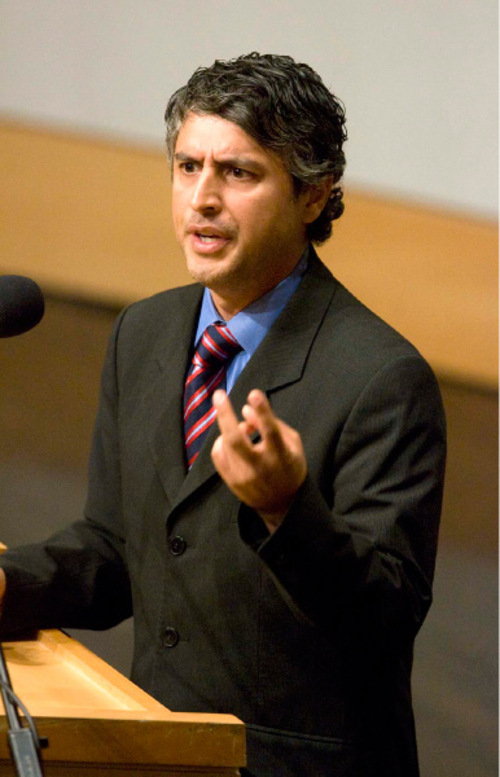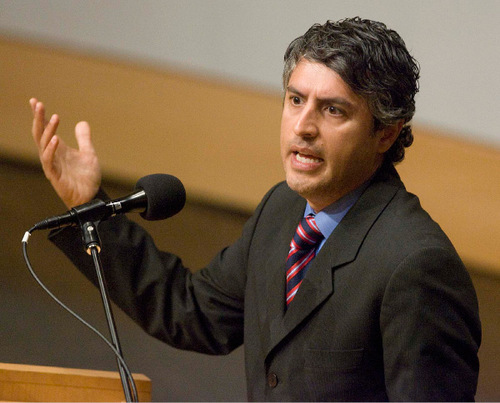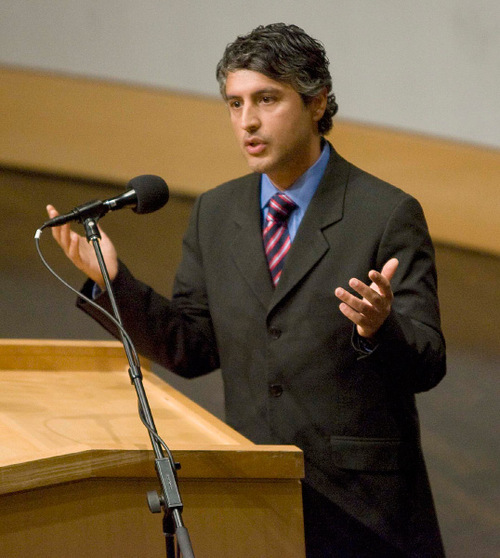This is an archived article that was published on sltrib.com in 2010, and information in the article may be outdated. It is provided only for personal research purposes and may not be reprinted.
United States history is rife with examples of religious bigotry the nation later outgrew after decades of assimilation with Catholics, Mormons and Jews, said visiting scholar Reza Aslan.
Islam will in time surmount the same obstacles, he said. But the politicized rhetoric against all things Islam means the stakes are much higher this time in the fight against divisiveness and for the American dream.
Aslan, author of the best-selling books No god But God: The Origins, Evolution, and Future of Islam and How to Win a Cosmic War: God, Globalization and the End of the War on Terror, told an overflow crowd Monday night at the Salt Lake City Main Library's auditorium that the best way to preserve the nation's tradition of religious freedom rests not in education. Instead, it resides in fostering relationships between Muslims and non-Muslims.
"Do you think that if I had 30 minutes in a room with [Fox News commentator] Bill O'Reilley that I would be able to change his mind? No," Aslan said. "But if the Muslim doctor who lives next door and wants the same future of peace for his children that you want and desire—if that is an enemy, then who is your friend?"
If world demographic trends continue, Aslan said, the world will soon be home to more Muslims than Roman Catholics. That growth will shape not just the world but also the United States, where American Muslims favor congregating in "garage mosques" and Islamic centers over places of worship more traditional to the Middle East.
"Are we ready for it? The answer is one we as individuals must face," Aslan said. "Relationships are in the hand of everyone in this room, and everyone in this nation. It's time to decide what it means to be American."
Aslan delivered his lecture "The Future of Islam" as part of The Tanner Humanities Center's 2010 Sterling M. McMurrin Lecture on Religion and Culture. Aslan's family moved from Tehran in 1979, the year of Iran's Islamic Revolution, to live in California's Bay Area. He became a United States citizen at age 23. After earning a bachelor's degree in religion, he attended Harvard Divinity School for a master's degree in theological studies. He later earned a master of fine arts from University of Iowa's renowned creative writing program, where he donned the affectionate title of Iowa's "first Islamic scholar." Today he teaches creative writing at the University of California, Riverside, and is a contributing editor to the online publication The Daily Beast.
With his GQ-smooth attire and irony-laden charm, Aslan opened his lecture joking that he's better known among Iranian expatriates as the nephew of famed Iranian singer Leila Forouhar. "I call her the Cher of Iran, but not to her face."
Recounting a recent trip to Europe where he came face-to-face with that continent's unease surrounding Muslims, Aslan said he returned home comforted by the knowledge that such xenophobia "couldn't happen here." Then he saw a TV advertisement sponsored by an organization called GOP Trust attacking the proposed "mosque at ground zero," which, as Aslan noted, was neither a mosque nor proposed for location at ground zero.
"The word 'They' has become very common nowadays," Aslan said.
Economic turmoil, the fatigue of war in Iraq and Afghanistan, plus heightened awareness of home-grown terrorist attacks all contribute to a climate where Americans feel they can dump their fears and anxiety onto Muslims. Aslan, who said he received his early education at the knee of Jesuits, said Americans can take comfort in both their civic traditions, which make American identity stronger than that of most Europeans, and the fact that religion in America has always been altered and enriched by those same civic traditions of tolerance and religious freedom.
Mocking Newt Gingrich's challenge that New York City's Islamic Center should be allowed only when Saudi Arabia allows the construction of churches, Aslan said it saddened him that America has given up "the war of ideas" in the fight against terrorism.
"I had no idea our constitutional freedoms depended on the actions of one of the most draconian nations on earth," Aslan said.







